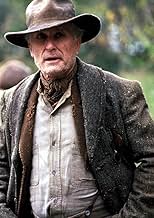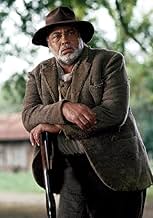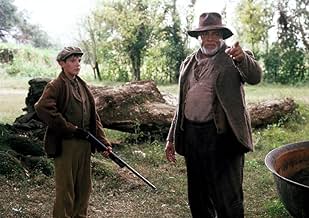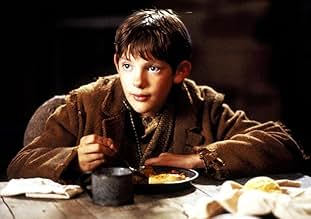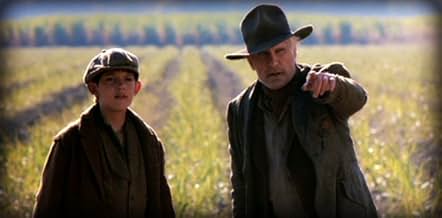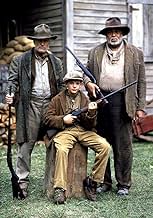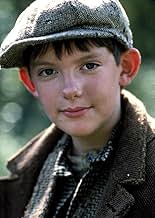Horton Foote's story of a teen-aged boy in the Depression who finds work on an eccentric's sugar plantation and learns life's surprising lessons from the team of convicts who also work there... Read allHorton Foote's story of a teen-aged boy in the Depression who finds work on an eccentric's sugar plantation and learns life's surprising lessons from the team of convicts who also work there.Horton Foote's story of a teen-aged boy in the Depression who finds work on an eccentric's sugar plantation and learns life's surprising lessons from the team of convicts who also work there.
Bob Edmundson
- Overseer
- (as Robert Edmundson)
Featured reviews
Like many stage adaptations, this film is a collection of set pieces without a tight overarching narrative. Not only is it adapted from the stage, but from the middle of a three-act play, which serves to remove some of the context; the viewer is just plopped into the middle of this one.
I thought the performances were good overall, but the production was somewhat lacking. Perhaps the streaming version I saw was a bad transfer, but the cinematography was nothing to write home about, the contrast was way too high in many of the daylight scenes, and the colors looked as if the film was shot on old, faded film stock.
A bit of a strange soundtrack too, but I liked it and I thought it was fitting.
I would recommend it if you like Foote, Faulkner, or Duvall.
I thought the performances were good overall, but the production was somewhat lacking. Perhaps the streaming version I saw was a bad transfer, but the cinematography was nothing to write home about, the contrast was way too high in many of the daylight scenes, and the colors looked as if the film was shot on old, faded film stock.
A bit of a strange soundtrack too, but I liked it and I thought it was fitting.
I would recommend it if you like Foote, Faulkner, or Duvall.
I don't know what to make of this film. It is certainly original and well-crafted. Duvall is outstanding as usual, as well as the supporting cast. Overall, the acting is superb, even young Horace, who is a bit stilted in his role, but that is the way the story is written. The plot never goes anywhere, and that is what is disappointing - the unidimensional nature of the story. More of a character study than a story. All in all, I may feel more strongly about the film in time, because it is the sort of cinema that stays with you, and that is the mark of a good film, anyway. Definitely unique and different and if you enjoy quirky movie, you may like this one.
My review was written in November 1991 after watching the film at a Manhattan screening room.
Robert Duval adds another memorable character to his screen portfolio in Horton Foote's "Convicts", a static, uncinematic play to film adaptation. Despite good supporting turns, the feature is strictly for Foote fetishists.
Given Duvall's stature and his quality work here it makes sense that 18 months-on-the-shelf pic is getting an Oscar qualifying run. Financial problems of its distributor MCEG account for the tardy release.
Foote has provided Duvall with some of his best screen roles, including the Faulkner adaptation "Tomorrow" and "Tender Mercies". Simpatico "Convicts" team also includes director Peter Masterson, who acted in "Tomorrow" and directed Foote's "The Trip to Bountiful"; and producer Sterling Van Wagenen, who made his directorial debut several months after this picture with "Convicts" co-star Lukas Haas starring in "Alan & Naomi". And Haas re-teamed a bit larger with Duvall to great effect in "Rambling Rose".
Unfortunately "Convicts", the second play in a nine-play cycle Foote calls "The Orphan's Home", does not present the sort of material suitable for modern film audiences. It might have worked best in the special interest format of Ely Landau's "American Film Theater" adaptations of the early 1970s.
Set on Texas's Gulf Coast on Christmas Eve in 1902 (actually lensed on Louisiana locations), "Convicts" is told through the observations of 13-year-old Haas, working in a country store on Duvall's sugar cane plantation. Many year's back, the land's tenant farmers were dismissed and convicts were contracted for low-cost labor replacements -not unlike the original slavery system.
Civil War veteran Duvall runs the farm but is senile, his affliction allowing Foote to out-Pinter Harold Pinter in dialog repetition. Duvall's interpretation is dead-on, as he continually asks Haas and anyone else in earshot the same inane questions to ultimately yield comic relief.
Presented without much continuity in elliptical vignettes, the story does not have a cumulative, dramatic narrative. Instead, various forms of cryptic behaviors are observed via Haas' eyes. Haas is trying to earn enough money to buy a headstone for his late father's unmarked grave and Duvall, making accelerating promises of wealth to Haas, gradually takes the boy under his wing.
The convicts of the title die of overwork or are shot to death 'escaping' almost randomly, with director Masterson emphasizing their symbolic function in the story by not explaining why. Duvall is so absentmnded he keeps asking if a specific convict is a Negro, and hnas to be reminded that they all are.
All the adult white people in the cast are constantly drunk, including Duvall's relatives Carlin Glynn and Gary Swanson, who loll around the house aimlessly. Foote's portrait of a decadent society on its last legs will not please Southerners but is vividly realized in microcosm here.
Haas, as in "Rambling Rose", provides impressive naturalism to balance Duvall's barnstorming performance. James Earl Jones is also quite understated, and besides Mel Winkler's convincing period portrayal, there is a powerfully modern, almost militant turn by Calvin Levels as a convict in chains who tells his sad story to Haas.
Toyomichi Kurita's frequently backlit photography captures the atmosphere of the place but the location shooting fails to disguise the story's theatrical origins.
Robert Duval adds another memorable character to his screen portfolio in Horton Foote's "Convicts", a static, uncinematic play to film adaptation. Despite good supporting turns, the feature is strictly for Foote fetishists.
Given Duvall's stature and his quality work here it makes sense that 18 months-on-the-shelf pic is getting an Oscar qualifying run. Financial problems of its distributor MCEG account for the tardy release.
Foote has provided Duvall with some of his best screen roles, including the Faulkner adaptation "Tomorrow" and "Tender Mercies". Simpatico "Convicts" team also includes director Peter Masterson, who acted in "Tomorrow" and directed Foote's "The Trip to Bountiful"; and producer Sterling Van Wagenen, who made his directorial debut several months after this picture with "Convicts" co-star Lukas Haas starring in "Alan & Naomi". And Haas re-teamed a bit larger with Duvall to great effect in "Rambling Rose".
Unfortunately "Convicts", the second play in a nine-play cycle Foote calls "The Orphan's Home", does not present the sort of material suitable for modern film audiences. It might have worked best in the special interest format of Ely Landau's "American Film Theater" adaptations of the early 1970s.
Set on Texas's Gulf Coast on Christmas Eve in 1902 (actually lensed on Louisiana locations), "Convicts" is told through the observations of 13-year-old Haas, working in a country store on Duvall's sugar cane plantation. Many year's back, the land's tenant farmers were dismissed and convicts were contracted for low-cost labor replacements -not unlike the original slavery system.
Civil War veteran Duvall runs the farm but is senile, his affliction allowing Foote to out-Pinter Harold Pinter in dialog repetition. Duvall's interpretation is dead-on, as he continually asks Haas and anyone else in earshot the same inane questions to ultimately yield comic relief.
Presented without much continuity in elliptical vignettes, the story does not have a cumulative, dramatic narrative. Instead, various forms of cryptic behaviors are observed via Haas' eyes. Haas is trying to earn enough money to buy a headstone for his late father's unmarked grave and Duvall, making accelerating promises of wealth to Haas, gradually takes the boy under his wing.
The convicts of the title die of overwork or are shot to death 'escaping' almost randomly, with director Masterson emphasizing their symbolic function in the story by not explaining why. Duvall is so absentmnded he keeps asking if a specific convict is a Negro, and hnas to be reminded that they all are.
All the adult white people in the cast are constantly drunk, including Duvall's relatives Carlin Glynn and Gary Swanson, who loll around the house aimlessly. Foote's portrait of a decadent society on its last legs will not please Southerners but is vividly realized in microcosm here.
Haas, as in "Rambling Rose", provides impressive naturalism to balance Duvall's barnstorming performance. James Earl Jones is also quite understated, and besides Mel Winkler's convincing period portrayal, there is a powerfully modern, almost militant turn by Calvin Levels as a convict in chains who tells his sad story to Haas.
Toyomichi Kurita's frequently backlit photography captures the atmosphere of the place but the location shooting fails to disguise the story's theatrical origins.
Robert Duvall is one of America's treasures. He should be given a Lifetime Achievement Award annually at the Academy Award ceremonies, and this film allows him to demonstrate, once again, how it's done. If you agree, by all means run, don't walk, to your nearest video store and rent "Rambling Rose", another of Duvall's gems...which, incidentally, also co-stars Lukas Haas, another underrated and terrific actor, as he shows in "Convicts". Most of Lukas' contribution is in the form of reaction to Duvall's ramblings, but the two of them, along with everyone else in the film, create a marvelous since of realism. Duvall is a mentally addled old drunk who can't remember that he said the same thing to you a few minutes ago, or what you told him, and it's to Duvall's credit that he manages to avoid being boring, as this sort of character so easily could have been. Duvall's character is also disreputable and mistreats the convict labor he has contracted for to work on his farm, but still you empathize with him. Lukas is, as always, wide-eyed (no one had larger eyes, or used them better) and innocent but not stupid. Horton Foote provided realistic dialog and a sure sense of place. This is a film not only to enjoy, but to study.
"Convicts" is very much a third act sort of film. All the dialogue and character interaction that occurs within it comes out of the long wind-down of a late southern day. And, by extension, the life of its main character, Soll (Robert Duvall).
This is the first collaboration of director Peter Masterson and writer Horton Foote. Six years earlier, the worked together on "The Trip to Bountiful", a film that seems almost action-packed in comparison to this one. Masterson is not necessarily a good director. In fact, he's just barely this side of adequate. The slow pace leaves a lot of room for cinematographer Toyomichi Kurita, who infuses the film with just the right sense of fragile light & warmth.
Because this is essentially a filmed play, with little in the way of editing or directing prowess, it all comes to the acting. As far as I'm concerned there's no flaws here. Robert Duvall and James Earl Jones, two of the best American actors (both born in January 1931), create characters that are wholly real, uninterested in anything besides living. Lukas Haas, a young actor who I was familiar with from "Testament" and "Witness", plays a character very much like his other early roles. He is quiet, withdrawn, slightly scared and sad, somehow. These are qualities that seem natural from him.
Perhaps a title like "Convicts" is a disservice to this film. That title, along with the opening scene, seem to create an image of a far more high-strung western type picture. If slow-paced stage productions don't interest you terribly, you'll want to pass on this one as well. Otherwise, this might be exactly the film you wish they made more often.
Enjoy.
This is the first collaboration of director Peter Masterson and writer Horton Foote. Six years earlier, the worked together on "The Trip to Bountiful", a film that seems almost action-packed in comparison to this one. Masterson is not necessarily a good director. In fact, he's just barely this side of adequate. The slow pace leaves a lot of room for cinematographer Toyomichi Kurita, who infuses the film with just the right sense of fragile light & warmth.
Because this is essentially a filmed play, with little in the way of editing or directing prowess, it all comes to the acting. As far as I'm concerned there's no flaws here. Robert Duvall and James Earl Jones, two of the best American actors (both born in January 1931), create characters that are wholly real, uninterested in anything besides living. Lukas Haas, a young actor who I was familiar with from "Testament" and "Witness", plays a character very much like his other early roles. He is quiet, withdrawn, slightly scared and sad, somehow. These are qualities that seem natural from him.
Perhaps a title like "Convicts" is a disservice to this film. That title, along with the opening scene, seem to create an image of a far more high-strung western type picture. If slow-paced stage productions don't interest you terribly, you'll want to pass on this one as well. Otherwise, this might be exactly the film you wish they made more often.
Enjoy.
Did you know
- GoofsWhen Soll thinks he hears someone in the closet he shoots three times and we see three bullet holes. But when Jackson opens the closet door to investigate, there are four holes.
- Quotes
Horace Robedaux: Martha, are you afraid of dying?
Martha Johnson: No, I ain't afraid. Just not ready to go yet.
- SoundtracksGolden Slippers
Sung by Jackson
- How long is Convicts?Powered by Alexa
Details
- Release date
- Country of origin
- Language
- Also known as
- Horton Foote's Convicts
- Filming locations
- Production company
- See more company credits at IMDbPro
Box office
- Gross US & Canada
- $13,623
- Opening weekend US & Canada
- $6,347
- Dec 8, 1991
- Gross worldwide
- $13,623
Contribute to this page
Suggest an edit or add missing content

